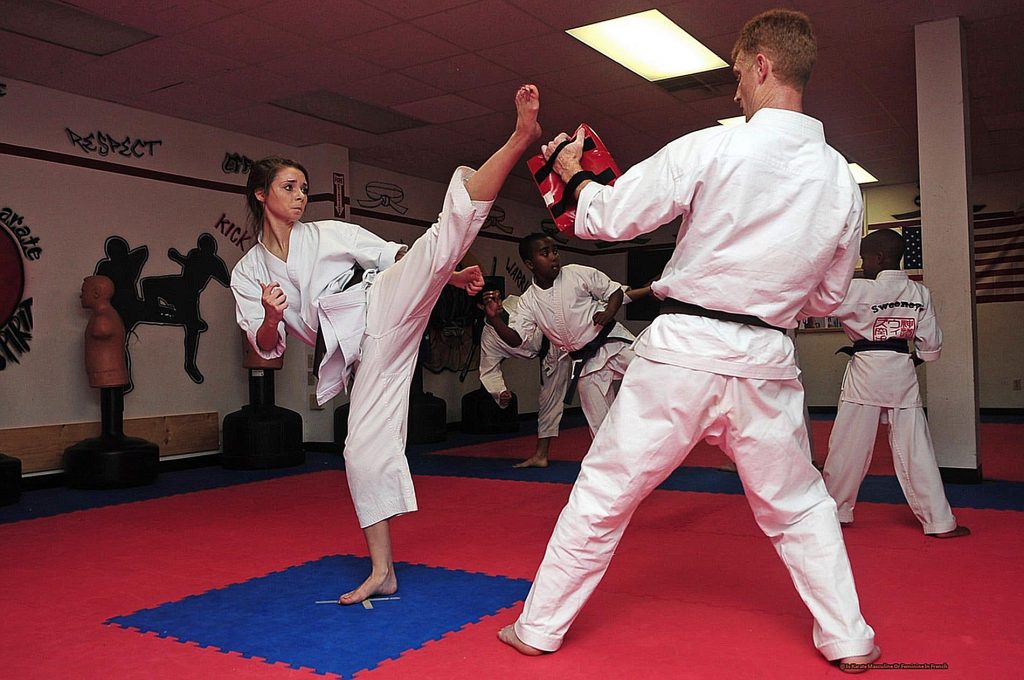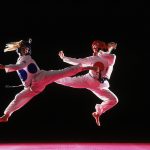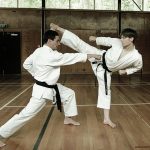Did you know that in French culture, karate has traditionally been seen as a masculine activity?
This association can be traced back to its origins in Japan, where it was primarily practiced by men.
However, times are changing and more and more women are stepping into the dojo (training hall) to practice this popular martial art form.
Despite this shift, traditional dojo in France still tend to have a male-dominated environment.
But don’t be fooled by appearances – female karateka (karate practitioners) are breaking barriers and excelling in the sport at national and international levels.
The French Karate Federation is also taking steps towards promoting gender equality by introducing mixed-gender team events in competitions.
While progress is being made, there is still a long way to go in breaking down the gender associations of karate in French society.
Ready to explore this question further? Join me as we delve into the evolving perceptions of masculinity and femininity within the world of karate in France.
Is Karate Masculine Or Feminine In French?
According to French grammar, Karate does not have a specific gender as it is known as a foreign term. Nevertheless, if one were to give it a gender, it would most likely be considered masculine due to its association with physical strength and prowess.
n the context of the French language, there are certain words that can be used for both masculine and feminine nouns, such as “le sport” (the sport) and “la discipline” (the discipline).
However, since Karate is a foreign word and is not commonly used in everyday French conversations, it does not fall under this category.
Moreover, the idea of assigning a gender to an abstract concept such as Karate can be quite perplexing. After all, how can something as intangible as a martial art have a gender? Yet, in many languages, words are assigned genders based on societal norms and associations. In this case, the physical and combative nature of Karate may have led to its hypothetical gender assignment.
But beyond grammatical debates, Karate also holds personal significance for many practitioners. For me, Karate symbolizes discipline, focus, and mental fortitude. Growing up, I struggled with ADHD and often felt like I couldn’t control my mind or body. However, when I started practicing Karate, I found that through rigorous training and repetition, I could develop the discipline and focus I needed to excel both in and out of the dojo.
In conclusion, while Karate may not have a grammatical gender in French, it holds significant meaning for those who practice it. Its association with physical strength and mental fortitude makes it a powerful art form that transcends language barriers. And perhaps that is what truly matters – not its hypothetical gender assignment but the impact it has on individuals’ lives.
Understanding Gender in French Grammar
When it comes to French grammar, the gender of a noun is determined by its ending and follows some general patterns. However, there are numerous exceptions, and ultimately, the gender of a noun must be learned individually. This also applies to words related to martial arts, like karate.
To grasp how French grammar assigns genders to nouns, let’s look at some examples. Nouns ending in -al or -ment are always masculine without any exceptions, such as le journal (the newspaper) and le mouvement (the movement). Similarly, nouns ending in -ard are always masculine without exception, such as le pétard (the firecracker) and le regard (the look). Additionally, nouns ending in -eau or -ou are usually masculine, but there are exceptions like la peau (skin) and la moue (pout).
However, when it comes to nouns related to martial arts, there is no specific rule for determining their gender. For instance, the word karate itself is masculine in French (le karaté), while judo is feminine (la judo). These genders must be learned individually and cannot be determined based on any grammatical patterns.
In conclusion, understanding gender in French grammar can be a challenging task due to the numerous exceptions and individual noun genders that must be learned. This also applies to words related to martial arts such as karate.
The Gender of Nouns and Adjectives in French
In French, every noun is classified as either masculine or feminine, adding intricacy to both speaking and writing. This is due to the fact that other words such as articles, pronouns, adjectives, and past participles must agree with the gender of the noun. The same goes for adjectives, which take on different forms depending on whether they are describing a masculine or feminine noun. For instance, the word “strong” in French is “fort” for masculine nouns and “forte” for feminine nouns.
When attempting to determine the gender of a noun in French, there are some general guidelines that can be helpful. For example, nouns that end in -age or -isme tend to be masculine, while those ending in -tion or -sion are usually feminine. However, there are numerous exceptions to these rules and it is crucial to pay attention to them in order to use the appropriate form of articles, pronouns, and adjectives.
In regards to the word “karate”, it would be categorized as masculine in French due to its ending in -e. As a result, articles such as “le” (masculine) or “un” (masculine) would be used before it instead of the feminine forms “la” and “une”. Similarly, adjectives used to describe karate would also take on the masculine form.
Moreover, verbs in past tenses may also require agreement with the gender of the noun. For example, if one were to say “I practiced karate” in French, the verb for practice (“pratiquer”) would change depending on whether the speaker is male or female.
To sum up, comprehending the gender of nouns and adjectives is a crucial aspect of mastering French. It necessitates careful attention to detail and knowledge of exceptions but becomes more natural with practice.
Is Karate Masculine or Feminine in French?
In the French language, all nouns are assigned a gender – either masculine or feminine. This gender classification affects the words that modify it, such as articles, adjectives, and pronouns. For those who grew up speaking Romance languages like French, this concept is second nature and instinctive. However, for English speakers learning French, it can be quite challenging to remember the gender of each noun.
So how is the gender of karate specifically determined in French? Based on general rules and patterns in the language, it would be classified as a feminine noun. This is because it ends in the letter “e,” a common characteristic of feminine nouns in French.
Moreover, karate falls under the category of sports and activities, which are typically considered feminine nouns in French. Other examples of feminine nouns in this category include “la danse” (dance), “la natation” (swimming), and “la gymnastique” (gymnastics).
However, as with any rule in language, there are exceptions. Some words that end in “e” can be masculine, and some sports or activities may be considered masculine instead of feminine. Therefore, it’s always advisable to consult a dictionary or ask a native speaker for clarification if unsure.
While there are general rules and patterns that can assist in determining the gender of a noun in French, it’s essential to remember that there are always exceptions. In particular, karate is classified as a feminine noun in French due to its ending and category.
Cultural Perceptions of Masculinity and Femininity in Relation to Karate
In French society, cultural perceptions of masculinity and femininity have a significant impact on karate practice and perception. The traditional origins of karate as a predominantly masculine pursuit, amplified by the media and societal attitudes, can restrict women’s involvement and reinforce the notion that karate is a male-dominated activity. This has also resulted in the segregation of classes by gender in certain dojos, further cementing the idea that karate is exclusively for men.
The history of colonization and chivalry in France also plays a role in shaping cultural views of masculinity and femininity, which can influence the approach to and perception of karate.
In today’s society, there is a growing trend towards gender inclusivity and breaking down stereotypes. However, traditional perceptions of masculinity and femininity can still hinder progress in certain areas, such as martial arts. As a result, many women may feel discouraged from participating in karate due to preconceived notions of gender roles. This not only limits their personal growth but also perpetuates the belief that karate is not for them.
To combat this issue, some dojos have started offering mixed-gender classes, promoting inclusivity and breaking down gender barriers. This shift in cultural perceptions is crucial in creating a more welcoming environment for all individuals to practice karate without feeling restricted by societal norms.
As someone who has been practicing karate for over 10 years, I have personally witnessed the impact of cultural perceptions on the sport. I have seen many talented female practitioners who have faced criticism or discouragement simply because they are women. This not only hinders their progress but also limits the diversity and growth of the karate community as a whole.
The Influence of Japanese Language on the Perception of Karate’s Gender
The impact of gendered language in Japan has a profound effect on how karate’s gender is perceived, not only within the country but also in other nations where Japanese is spoken. This is particularly evident when examining how karate, a long-standing Japanese martial art, is viewed through the lens of the French language. From the intricacies of writing systems to the use of honorifics and translations, these linguistic nuances hold immense power over the gendered perception of karate.
One prime example of this influence can be seen in the use of pronouns when referring to karate. In Japanese, the term “karateka” is used for both male and female practitioners, emphasizing equality and unity in the art. However, when translated into French, “karateka” becomes “karateka homme” for male practitioners and “karateka femme” for female practitioners, highlighting a clear distinction between the two genders.
Moreover, many French translations of Japanese martial arts texts use masculine pronouns and adjectives when referring to techniques or principles, further perpetuating the idea that karate is a predominantly male practice. This stark contrast in language usage can shape one’s perception of karate as a male-dominated activity, despite its roots in Japan’s samurai culture where women were also trained in martial arts.
It is crucial to recognize the impact of language on our perceptions of gender in martial arts. By acknowledging and understanding these linguistic nuances, we can strive towards a more inclusive and accurate representation of karate as a gender-neutral practice.
How to Navigate Gendered Language When Discussing Karate in French
When it comes to discussing karate in French, navigating the grammatical rules of the language can present challenges due to its highly gendered nature. As we know, every aspect of French, from adjectives to nouns, has a specific gender, which can be problematic for non-binary individuals or those who do not conform to traditional gender roles.
For non-native speakers, using gendered language when discussing karate in French can be confusing as they may struggle to determine the correct form of the word. This can result in incorrect usage and misunderstandings.
Additionally, the masculine form is often considered the standard or “root” of the word, making it difficult to create non-binary alternatives that feel natural or authentic.
Moreover, institutions such as the French Academy also play a significant role in shaping the use of gendered language in relation to karate. The Academy not only upholds traditional gender roles but also holds influence over government decisions and laws regarding language usage. This can impede the development of inclusive vocabulary in France and hinder progress towards a more inclusive language.
However, as seen in other Romance languages like Spanish and Italian, specific endings are used to distinguish between masculine and feminine words. This approach could potentially be adopted in French to introduce a third ending for non-binary forms when discussing karate.
It may offer a solution to address the challenges posed by gendered language.
Conclusion
In conclusion, while the French language may not assign a grammatical gender to karate, it has traditionally been perceived as a masculine pursuit due to its origins in Japan and societal norms.
However, with the rise of inclusivity and breaking down stereotypes, more women are embracing karate and excelling in the sport. Despite this progress, traditional dojo in France still tend to have a male-dominated environment.
Navigating gendered language when discussing karate can also be challenging, but efforts are being made to introduce non-binary terminology and promote inclusivity.






